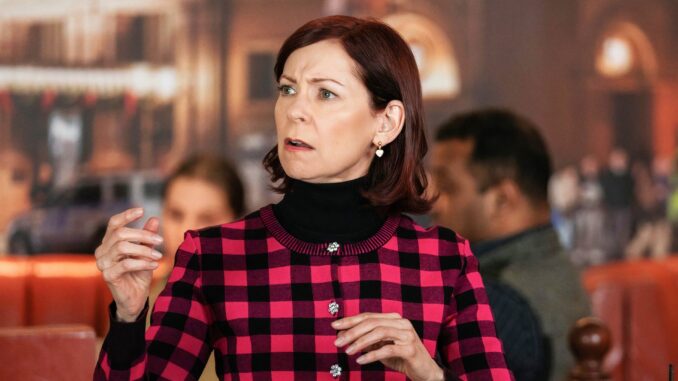
The sudden, stark announcement landed like a meteor in the meticulously scheduled universe of late-night television: The Late Show with Stephen Colbert was, effectively immediately, cancelled. A collective gasp rippled through social media, followed by a torrent of disbelief and grief. How could the man who had navigated political turmoil with such intellectual dexterity, who had made us laugh and think and even cry, simply vanish from our screens? The void felt immense, a quiet echo where vibrant wit once resided.
Then, from the digital ether, a whisper began to circulate, a rumor so deliciously improbable it had to be a joke. But then, the official press release dropped, and the internet exploded. Stephen Colbert, in an audacious stroke of meta-narrative genius, was joining the cast of Elsbeth. Not as a guest, not as a recurring character, but as a series regular. The collective 'Aha!' moment was almost audible, a wave of delight washing over a fanbase that had been mourning just moments before. This wasn't just a surprising career move; it was a masterclass in reinvention, a meta-twist that resonated with fans on a profound, almost spiritual level.
The "meta" layer of this twist is what truly elevated it beyond mere casting news. Colbert, for decades, had been the ultimate late-night host – whether as the bombastic pundit of The Colbert Report or the earnest, intelligent interviewer of The Late Show. His persona was intrinsically linked to that gleaming desk, the live studio audience, the nightly monologue dissecting the absurdity of the world. To see that stage suddenly dark, only for him to resurface in the kaleidoscopic, off-kilter world of Elsbeth Tascioni, was a deliberate, knowing wink to the audience.
Imagine his first appearance: Elsbeth, mid-investigation, might stumble upon him in a New York City park, meticulously cataloging the different species of squirrels, perhaps muttering something wry about the transient nature of public platforms. Or perhaps he's introduced as a surprisingly astute neighbor in Elsbeth’s apartment building, offering unsolicited (but uncannily accurate) observations on the bizarre goings-on. The genius lies in the show acknowledging his past without being beholden to it. There could be a wry, self-deprecating line about "suddenly having a lot of free evenings" or a passing reference to "a recent career change that involved less talking to politicians and more talking to myself." This isn't just an actor taking a new role; it’s Stephen Colbert, the idea of Stephen Colbert, finding a new stage, a new lens through which to engage with the world, leaving the fourth wall delightfully fractured.
The synergy between Colbert and Elsbeth is another stroke of brilliance. Elsbeth, with her unique gaze and ability to see the patterns others miss, is a human kaleidoscope of quirks and uncanny insight. Colbert, with his laser-sharp intellect, his quick wit, and his master's degree in dissecting absurdity, perfectly complements her. He’s not a detective, not a lawyer, but he brings an analytical mind accustomed to finding the cracks in narratives and exposing the truth behind polished facades. He could be a retired journalist, a linguistics professor, or even a self-proclaimed "pundit emeritus" who, without the daily grind of late-night, has found a new hobby in observing human nature – and crime.
Picture the scene: Elsbeth is fixated on the subtle scent of lavender, convinced it holds the key, while Colbert, standing nearby, is meticulously explaining the socio-economic implications of artisanal soap trends, inadvertently providing the missing piece of the puzzle through his tangential, yet brilliant, observations. Their dynamic would be a comedic and intellectual goldmine: her intuitive leaps met by his meticulously constructed theories, both leading, in their own circuitous ways, to the same truth. Fans would revel in the verbal sparring, the unexpected alliances, and the sheer delight of watching two unconventional minds dance around the intricacies of a mystery.
And that, ultimately, is why fans loved it. It was a balm for the sting of cancellation, a reaffirmation of Colbert’s enduring brilliance, not just as a host, but as a performer and an intellect. It offered a sense of continuity, a belief that talent, especially talent as singular as Colbert's, cannot simply be snuffed out. It satisfied the inherent human desire for a good story, for an unexpected twist that makes perfect sense in hindsight. It transformed a moment of loss into a moment of gain, delivering not just a new role, but a meta-narrative that celebrated resilience, humor, and the wonderfully porous boundary between performer and character.
The Colbert-Elsbeth twist wasn't just a TV show making a clever casting choice; it was a love letter to the discerning viewer, a testament to the power of reinvention, and a defiant, humorous declaration that even when one stage goes dark, the show, in its own glorious, meta way, truly does go on. It reminded us that the most captivating stories often emerge from the most unexpected intersections, leaving us eagerly awaiting the next delightfully unconventional clue. The stage may have gone dark, but the spotlight, brilliantly, has found its new, most unexpected corner.
